Byculla Restaurant & Bakery and Regal Restaurant & Bakery are two Irani cafés on either sides of the Byculla (East) flyover. Suprita Mitter discovered that they have a lot more in common that Irani chai, and an old-world charm
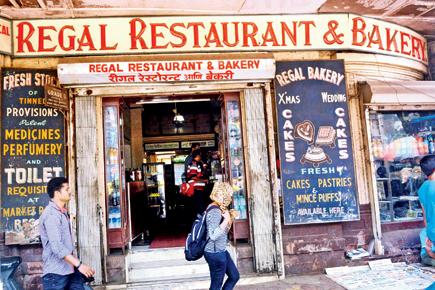
Darius, Byculla Restaurant & Bakery
Bun Maska and a glass of sweet, milky chai; we can’t think of a better way to start our morning. One such quest for happiness took us to Regal Restaurant & Bakery at Byculla (E), near the railway station exit. The checked floor tiles, vintage furniture and signage at their store (also a part of the restaurant), made us wonder how many such cafés remain, especially in Byculla. However, this neighbourhood has one on either side of the flyover, which we found interesting. As we crossed the road from Regal, we spotted Byculla Restaurant & Bakery on the opposite side.
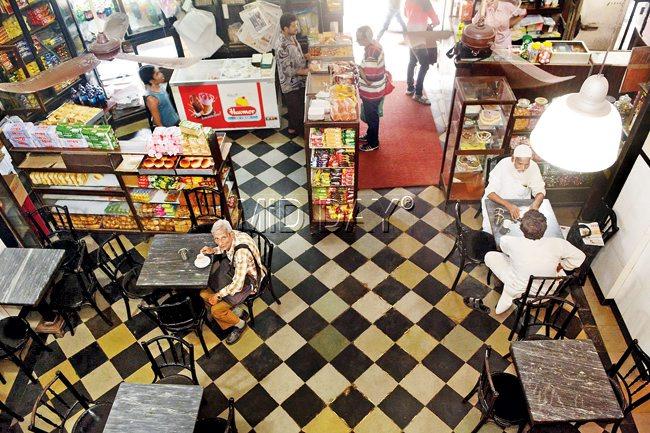
Regal Restaurant and Bakery near Byculla (E) railway station. Pic/Sayed Sameer Abedi
The Iran connection
“It was started in 1932, by my great grandfather, who came to India from Iran, in a caravan. He started this place alongside Palace cinema, which in the 1930s, screened hit English and Hindi movies. When it changed hands, other things also changed. The cinema shows Bhojpuri films now, that caters to a different audience,” says young Porus Merwan Zainabadi, the third-generation owner of Regal.
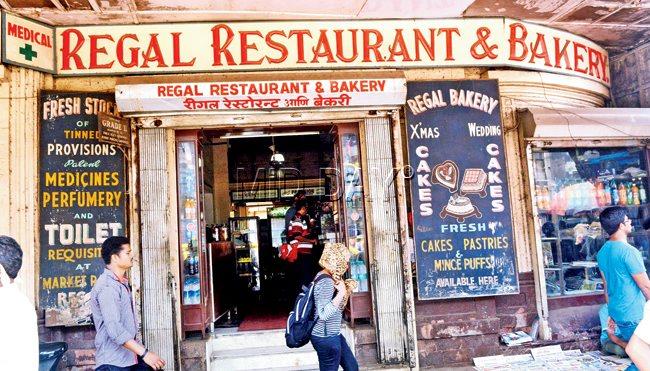
Darius, Byculla Restaurant & Bakery Pic/Sayed Sameer Abedi
Across the road, when we enquired about the origins of the Byculla Restaurant, a similar story unfurled. “My father came to India from Iran. He started a small shop, and expanded slowly. The restaurant is over 100 years old. We had partnerships in five restaurants including the Renault and Rolex. Over the years, we sold them off because we couldn’t manage. I started running this place since I was 18; my brother looks after the pharmacy,” says Darius (last name withheld on request) who was happy to chat with us but didn’t wish to reveal his full identity.
After some prodding, we learnt that both restaurant owners are related to each other. “Darius uncle, who owns Byculla Bakery, is related to me. His grandfather and my grandfather were brothers,” Zainabadi tells us.
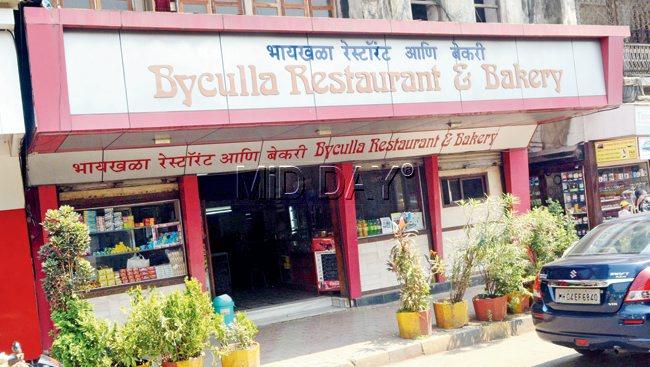
Porus Merwan Zainabadi, Regal Restaurant & Bakery
The old boys
At a time when new restaurants open every day, both Irani restaurants have managed to retain their staff for decades. “Our employees have been with us for over 40 years. They eat here. I offer them a meal of a dal, a vegetable, two chicken, two mutton and two fish items, every week. I treat them like my own,” reveals Darius. “Today, most people want to work at malls because they pay higher,” he reasons.
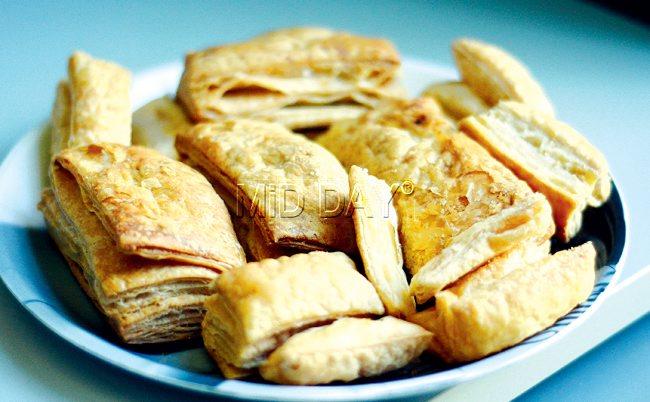
Khari, Mawa Samosa from Regal Restaurant & Bakery
“Some employees have carried me on their shoulders when I was a boy. They are family. It is hard to find such employees these days,” admits Zainabadi, pointing out a white-haired man at the counter, who he addresses as ‘Chacha’.
Down memory lane
“People still want their Bun Maska. Even Catholics come for our plum cakes, during Christmas,” says Darius, as we take the kitchen tour, where he shows me the old wooden oven and the new electric one, offering me a hot, crisp Khari. Zainabadi hits a nostalgic note, “Many who visited us as kids now return with their families. They love to share their stories with them.”
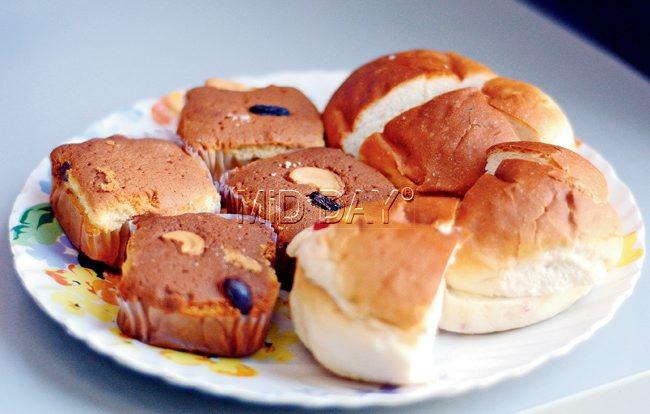
Bun Maska, Mawa Cake from Byculla Restaurant & Bakery
Survival issues
With changing times, both restaurants are facing similar challenges to stay afloat. “I started running this place in 2000. Irani cafés were located at the corners of roads — at junctions — placing them at vantage points, making it convenient for people to spot them, stop by and buy what they needed. We had all kind of clientele, from the rich to the poor. Today, with home deliveries, a vantage point ceases to exist. People prefer visiting a mall for groceries, watch a movie or grab a bite,” reveals Zainabadi, pensively.
“The flyover didn’t exist earlier. Now, few pass by. The demographic of the area has changed. Catholics from here moved to New Bombay (Navi Mumbai). Muslims and Bohris now live here. The Byculla vegetable market has moved, and the flower market will move soon. Those who worked at the market liked us to open at 5 am, so they could eat their breakfast before work,” he recalls, reminding me to sip on my chai, as it might get cold. “Being near the station doesn’t help.
People are in a rush to catch their trains. Footpath stalls, with no overheads and no licenses, steal a lot of our business. It’s unfortunate,” sighs Zainabadi.
Byculla’s Darius has a similar tale, “Earlier on Sundays, after mass, it was tough to find a seat here. After the Catholic community moved, this has changed. People visit malls and pay nearly R200 for a cup of coffee. I’ve been there too. I can give you better coffee but you want the fancy cups and ambience,” he quips, adding, “Earlier, we would sell about 300 cups of coffee a day; now, it’s dropped to 50 cups. For the last few months, I have been paying out of my pocket for salaries. Tax, water and electricity has become so expensive,” he rues.
The last of a legacy
Darius is unsure about the future, “The restaurant was my father’s wish. It’s why we are running it. My children are abroad; they don’t wish to return and work here. It isn’t easy to get good managers. In June this year, my wife will retire as a lecturer at KEM Hospital. After she does, we will decide if we should keep or sell the restaurant. I wish to retire. Each time I think I will, I wonder what will I do at home,” he admits.
He tells us about food inspectors who tell his staff to not keep hot baking trays on the floor, and keep it on marble-top tables instead. “We need to explain that the marble will crack. There are no flies in my kitchen; it is cleaner than most home kitchens. You pay them Rs 5,000, and they don’t have complaints anymore,” he adds angrily.
“While taking over, many including my family, advised me to rethink, but I wanted to. I would like to pass it on to the next generation. I like when people bring their families here. It gets nostalgic for them. If I home-deliver, future generations will never know about the place. We hope that word-of-mouth and nostalgia helps,” a hopeful Zainabadi signs off, as daily business beckons.
 Subscribe today by clicking the link and stay updated with the latest news!" Click here!
Subscribe today by clicking the link and stay updated with the latest news!" Click here!







